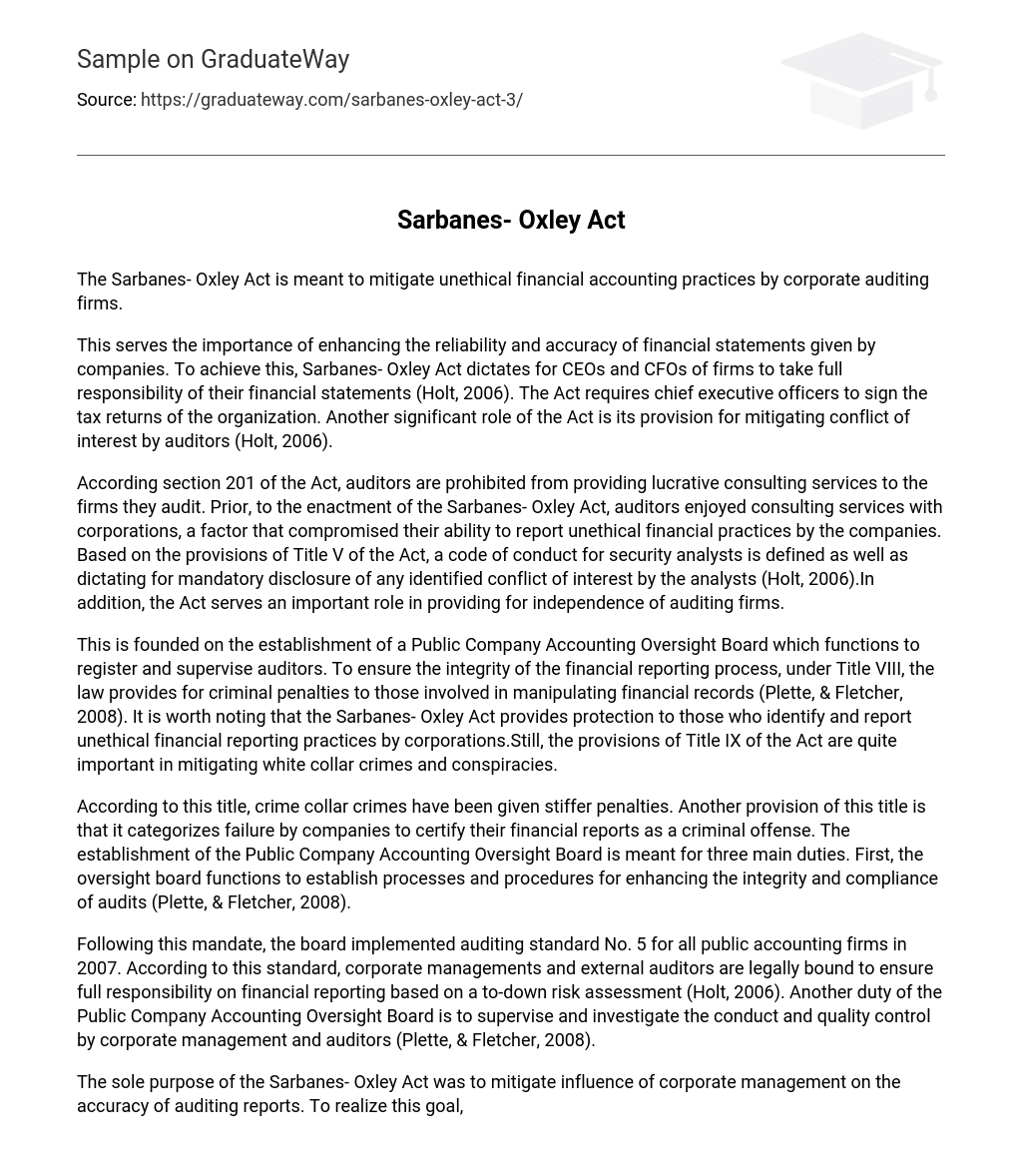The Sarbanes- Oxley Act is meant to mitigate unethical financial accounting practices by corporate auditing firms. This serves the importance of enhancing the reliability and accuracy of financial statements given by companies. To achieve this, Sarbanes- Oxley Act dictates for CEOs and CFOs of firms to take full responsibility of their financial statements (Holt, 2006). The Act requires chief executive officers to sign the tax returns of the organization. Another significant role of the Act is its provision for mitigating conflict of interest by auditors (Holt, 2006).
According section 201 of the Act, auditors are prohibited from providing lucrative consulting services to the firms they audit. Prior, to the enactment of the Sarbanes- Oxley Act, auditors enjoyed consulting services with corporations, a factor that compromised their ability to report unethical financial practices by the companies. Based on the provisions of Title V of the Act, a code of conduct for security analysts is defined as well as dictating for mandatory disclosure of any identified conflict of interest by the analysts (Holt, 2006).In addition, the Act serves an important role in providing for independence of auditing firms.
This is founded on the establishment of a Public Company Accounting Oversight Board which functions to register and supervise auditors. To ensure the integrity of the financial reporting process, under Title VIII, the law provides for criminal penalties to those involved in manipulating financial records (Plette, & Fletcher, 2008). It is worth noting that the Sarbanes- Oxley Act provides protection to those who identify and report unethical financial reporting practices by corporations.Still, the provisions of Title IX of the Act are quite important in mitigating white collar crimes and conspiracies.
According to this title, crime collar crimes have been given stiffer penalties. Another provision of this title is that it categorizes failure by companies to certify their financial reports as a criminal offense. The establishment of the Public Company Accounting Oversight Board is meant for three main duties. First, the oversight board functions to establish processes and procedures for enhancing the integrity and compliance of audits (Plette, & Fletcher, 2008).
Following this mandate, the board implemented auditing standard No. 5 for all public accounting firms in 2007. According to this standard, corporate managements and external auditors are legally bound to ensure full responsibility on financial reporting based on a to-down risk assessment (Holt, 2006). Another duty of the Public Company Accounting Oversight Board is to supervise and investigate the conduct and quality control by corporate management and auditors (Plette, & Fletcher, 2008).
The sole purpose of the Sarbanes- Oxley Act was to mitigate influence of corporate management on the accuracy of auditing reports. To realize this goal, the act mandates the oversight board with the authority to inspect the functioning of auditor. The board is also responsible for registering public accounting professionals based on their operational records (Holt, 2006). Lastly, the Public Company Accounting Oversight Board is charged with the duty of enforcing compliance of public accounting firms based on the provisions of the Sarbanes- Oxley Act.
Among these provisions is ensuring that senior corporate executive bear responsibility for the accuracy of published financial statements. The board is also responsible for punishing auditors who engage in non-auditing services with their audit clients. It is upon the mandate of the oversight board to ensure that detailed and timely disclosure of financial information by firms (Plette, & Fletcher, 2008). Therefore, the oversight board serves the purpose of overseeing efficient and reliable accounting practices by both company managements and external auditing firms.





